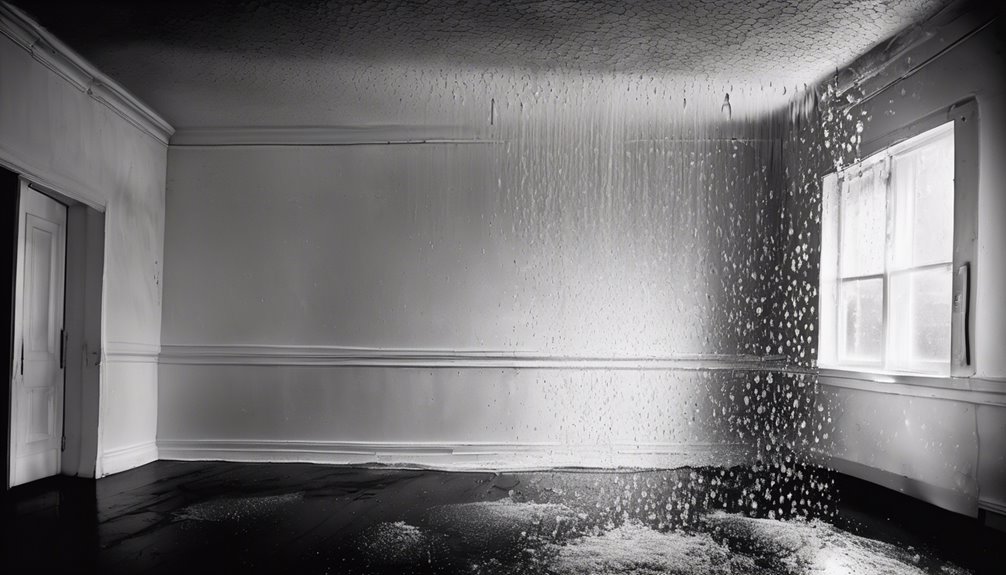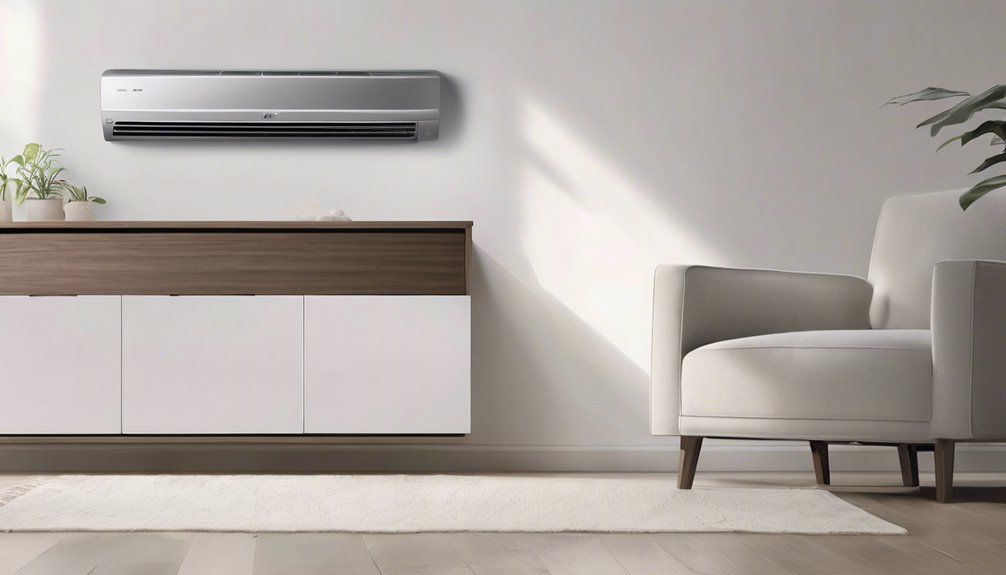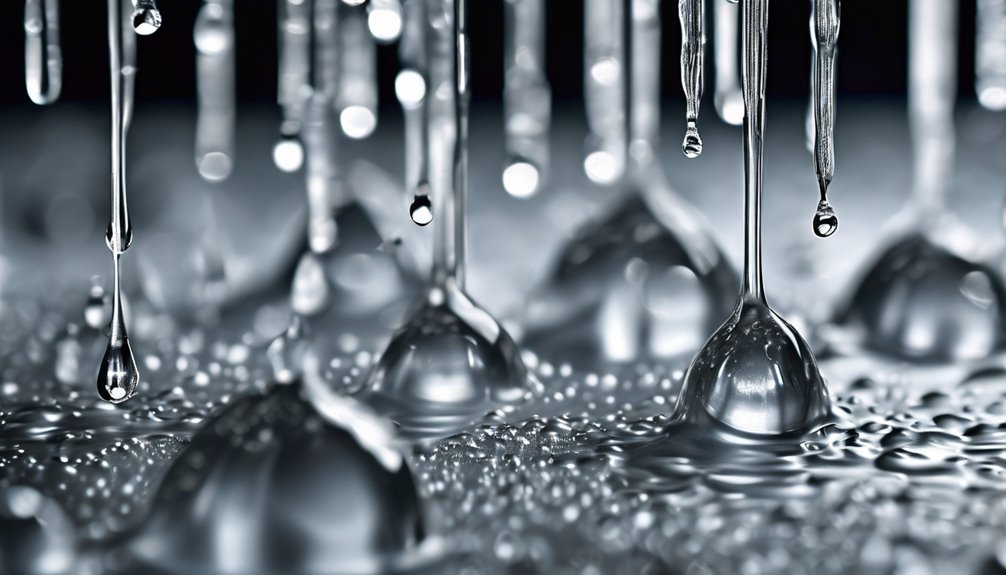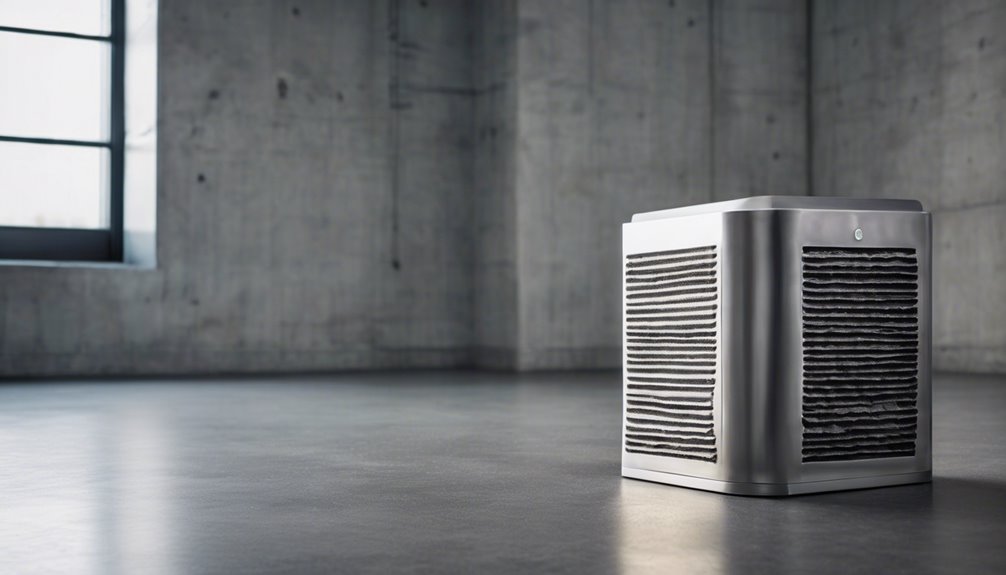You're probably unaware of the hidden menace lurking behind your air conditioner's steady hum – water leakage. It's a silent threat that can unleash a torrent of health risks, property damage, and financial burdens if left unchecked. Mold growth, respiratory problems, electrical shock, and structural damage are just a few of the dangers that can arise from ignoring AC water leakage. The consequences can be devastating, and the longer you wait, the more damage it can cause. Want to learn more about the dangers and how to prevent them?
Key Takeaways
- AC water leakage poses serious health risks, including respiratory problems, allergic reactions, and infections from mold and mildew growth.
- Electrical fire hazards can be deadly, with water leakage causing short circuits and potentially fatal shocks.
- Water seepage can lead to structural damage, including roof rotting, beam weakening, and foundation cracks, compromising a home's integrity.
- Ignoring AC water leakage can result in a hefty financial burden, including repair costs, insurance premium hikes, and downtime.
- Delaying action on AC water leakage can amplify destruction and expense, putting property and finances at greater risk.
The Hidden Dangers of AC Water Leakage
As you enjoy the cool comfort of your air-conditioned space, you mightn't be aware of the potential threat lurking behind the walls or beneath the floor.
AC water leakage can lead to water contamination, which can cause significant damage to your property and put your health at risk.
Neglecting AC maintenance can result in clogged condensate drains, causing water to accumulate and seep into walls, floors, and ceilings.
This can lead to structural damage, electrical issues, and even fire hazards.
Furthermore, stagnant water can become a breeding ground for bacteria and other microorganisms, contaminating your air and water supply.
It's essential to prioritize AC maintenance to prevent water leakage and ensure a safe and healthy living environment.
Mold Growth and Respiratory Problems
When AC water leakage goes unchecked, it creates an ideal environment for mold growth.
You'll find yourself breathing in humid environments that are perfect for mold to thrive. As mold grows, it releases airborne toxins into the air, which you'll inevitably inhale.
These toxins can trigger respiratory problems, such as allergies, asthma, and even chronic bronchitis. If you're sensitive to mold, you might experience symptoms like coughing, sneezing, and itchy eyes.
Mold toxins can trigger allergies, asthma, and chronic bronchitis, causing symptoms like coughing, sneezing, and itchy eyes in sensitive individuals.
Prolonged exposure can lead to more severe health issues, so it's crucial to address AC water leakage promptly. Don't let mold growth turn your home into a hazardous space – take action to fix the leak and dry out the area before it's too late.
Electrical Shock and Fire Hazards
As you inspect your AC unit for water leakage, you're not just looking for signs of mold and mildew –
you're also searching for potential electrical shock risks that can put your life in danger. Water and electricity don't mix, and when they do, hidden fire dangers can spark without warning.
You'll need to identify arc fault hazards that can ignite a blaze, or worse, electrocute you or a loved one.
Electrical Shock Risks
Water leakage around your AC unit can expose you to electrical shock risks, which can be deadly.
When water comes into contact with electrical components, it can cause a short circuit, leading to a potentially fatal shock. To minimize this risk, it's essential to follow safety protocols, such as turning off the power supply to the AC unit when you notice water leakage.
- Regularly inspect your AC unit for signs of water leakage or damage.
- Ensure your AC unit has a waterproof design to prevent water from seeping into electrical components.
- Keep the surrounding area clear of clutter and obstructions to prevent water from accumulating around the unit.
Hidden Fire Dangers
Beyond the risk of electrical shock, AC water leakage also conceals hidden fire dangers.
You mightn't notice the water seeping into your AC unit, but it can cause a fire hazard. Water and electricity don't mix, and when they do, it can spark a fire.
Corrosion and short circuits can occur when water comes into contact with electrical components, increasing fire risks.
These hidden hazards can be deadly, and you mightn't even be aware of them until it's too late.
As you continue to use your AC, the risk of a fire grows.
Don't wait until a fire breaks out; take action now to prevent AC water leakage and reduce the risk of hidden fire dangers.
Arc Fault Hazards
Your air conditioner's electrical system is a ticking time bomb when water leakage is present.
Water and electricity are a deadly combination, and the results can be devastating.
When water seeps into your AC's electrical system, it can cause an arc fault, which can lead to electrical shock or even a fire.
Three reasons why arc fault hazards are a serious concern:
- Faulty wiring: Water can corrode wires, causing them to short circuit and spark, which can ignite nearby flammable materials.
- Circuit overload: Water can increase the electrical resistance in your AC's circuits, leading to an overload that can cause a fire.
- Electrical shock: If you touch your AC while it's leaking water, you can receive a deadly electrical shock.
Don't ignore the warning signs of water leakage in your AC.
Address the issue promptly to avoid these hazards.
Structural Damage and Ceiling Collapse
Structural integrity is a top concern when dealing with AC water leakage, and for good reason. Water seepage can lead to devastating consequences, including roof rotting and beam weakening. This can cause your ceiling to collapse, putting you and your loved ones at risk.
| Damage | Description | Consequences |
|---|---|---|
| Roof Rotting | Water seeps into roofing material, causing decay | Ceiling sagging, collapse |
| Beam Weakening | Water corrodes metal beams, reducing strength | Structural failure, collapse |
| Ceiling Delamination | Water seeps behind ceiling tiles, causing separation | Ceiling collapse, injury |
| Wall Cracking | Water seeps into walls, causing cracks and damage | Structural instability, collapse |
You shouldn't ignore signs of AC water leakage, as the consequences can be catastrophic. Don't wait until it's too late – address the issue promptly to avoid structural damage and ceiling collapse.
Health Risks and Allergic Reactions
Mold and mildew thrive in damp environments, and AC water leakage creates the perfect breeding ground for these hazardous microorganisms.
As you inhale the spores, you're at risk of respiratory problems, allergic reactions, and even infections.
You may experience:
- Skin irritation: Redness, itchiness, and rashes can occur when your skin comes into contact with mold or mildew.
- Eye infections: If you touch your eyes after handling moldy surfaces, you can transfer the spores and cause eye infections.
- Respiratory issues: Inhaling mold spores can trigger asthma attacks, bronchitis, and other respiratory problems.
Water Damage and Property Loss
Water seepage from a leaking AC unit can wreak havoc on your home, causing damage that can be costly and time-consuming to repair.
Ceilings, walls, and floors can become waterlogged, leading to structural damage and potentially collapsing. You'll be left dealing with the aftermath, filing insurance claims, and paying for restoration costs.
The longer you wait to address the issue, the more extensive the damage will be, and the higher the costs will climb. Don't underestimate the severity of water damage – it can lead to significant property loss and financial strain.
Delaying action on water damage only amplifies destruction and expense, putting property and finances at greater risk.
Take action immediately to mitigate the damage and prevent further destruction.
Unseen Consequences of Ignored Leaks
As you ignore the signs of water leakage, you're unwittingly creating an environment where mould and mildew can thrive, putting your health at risk.
Meanwhile, water seeping into your walls and floors can also spark electrical fires or compromise your home's structural integrity.
Mould and Mildew Growth
Hidden from view, a silent threat lurks in the damp, dark recesses of your air conditioning system.
You mightn't notice it at first, but ignored water leaks can lead to mould and mildew growth.
This can cause a musty smell to permeate your home, making it uncomfortable to breathe.
A humid environment is the perfect breeding ground for these microorganisms, and they can spread quickly if left unchecked.
- Respiratory issues: Exposure to mould and mildew can trigger allergies and respiratory problems, such as asthma.
- Property damage: Mould and mildew can weaken the structure of your home, leading to costly repairs.
- Health risks: In severe cases, mould and mildew can produce toxins that can cause serious health issues.
Electrical Fire Hazards
When mould and mildew take hold, it's not just your health and property that are at risk.
You're also exposing yourself to electrical fire hazards. Water seepage can come into contact with faulty wiring, causing short circuits that spark fires. Overheating circuits are another concern, as they can ignite nearby flammable materials.
If you ignore AC water leakage, you're playing with fire – literally. It's crucial to address these issues promptly to avoid devastating consequences.
Don't wait until it's too late; inspect your AC unit regularly and take immediate action if you notice any signs of water damage. Your safety depends on it.
Structural Damage Risks
Water seepage from your AC unit can have far-reaching consequences, and one of the most destructive is structural damage to your home.
You mightn't notice it at first, but the constant dripping can lead to devastating effects over time.
- Foundation cracks: Water can seep into the foundation of your home, causing cracks and weakening its overall integrity.
- Wood rot: Excess moisture can cause wood to decay, leading to weakened beams and a compromised structural framework.
- Ceiling and wall damage: Water can seep into walls and ceilings, causing damage to drywall, paint, and other finishes, which can lead to costly repairs.
Don't let ignored leaks put your home at risk.
Addressing AC water leakage promptly can save you from these unseen consequences.
The Financial Burden of Neglect
Ignoring AC water leakage can lead to a hefty price tag, and you'll be the one footing the bill.
Not addressing the issue promptly can result in increased insurance costs, as water damage claims can lead to premium hikes.
Moreover, the financial strain doesn't stop there. You'll likely need to shell out money for repairs, replacements, and even potential mold remediation.
If you're a homeowner, you may need to pay for temporary accommodations while your home is being fixed. If you're a business owner, you might lose revenue due to downtime.
The longer you wait, the more you'll pay. It's essential to take AC water leakage seriously and address it promptly to avoid draining your bank account.
Identifying and Addressing the Root Cause
Your AC unit's water leakage issue won't resolve itself, and it's crucial to identify the root cause to prevent further damage.
You can't just patch up the problem and expect it to go away. To get to the bottom of the issue, you'll need to perform some leak detection and system maintenance.
- Check the drainage system: Ensure it's not clogged and that water can flow freely.
- Inspect the condenser coils: Clean or replace them if they're dirty or damaged.
- Monitor the refrigerant levels: Low levels can cause the AC to work harder, leading to increased condensation and water leakage.
Frequently Asked Questions
Can I Fix an AC Water Leak Myself?
You can try to fix an AC water leak yourself with a DIY toolkit, but first, you'll need to identify the source using leak detection methods, and if you're not comfortable, it's best to call a professional to avoid further damage.
How Long Does It Take for Mold to Grow From AC Leaks?
You'll be surprised to know that mold can grow from AC leaks in as little as 24-48 hours, especially when hidden moisture sources are present, and mold growth rates accelerate in humid environments with poor ventilation.
What Causes AC Water Leaks in the First Place?
You might wonder what triggers AC water leaks, and it's often due to clogged air filters or coils, which reduce airflow, causing condensation buildup, and blocked drainage systems that prevent water from escaping properly.
Can AC Water Leaks Cause Carbon Monoxide Poisoning?
You're right to worry about carbon monoxide poisoning from AC water leaks, as they can produce toxic fumes, making it a silent killer; if your AC's condensate line is clogged, it can lead to CO buildup, putting you and your family at risk.
Will My Insurance Cover AC Water Leak Damage?
You'll need to review your policy exclusions to see if AC water leak damage is covered. If it is, you'll need to file a claim, providing proof of the leak and resulting damage, and then wait for the claim process to unfold.
Conclusion
You've learned the hard way that AC water leakage is no trivial matter. From mold growth to electrical shock, structural damage, and health risks, the consequences of ignoring a leak can be devastating. Don't wait until it's too late – identify and address the root cause of the issue to avoid a world of trouble. Remember, a small leak today can become a huge problem tomorrow, putting your health, safety, and wallet at risk. Take action now to prevent a disaster from unfolding.



